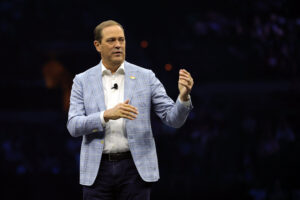Investing in companies pioneering new industries in which the rules haven’t yet been written is typically reserved for venture capital investors who can stomach much higher risk and uncertainty. But every so often, a truly novel business concept becomes available in the public markets as well. Virgin Galactic, a leader in the future industry of commercial space travel, fits this description.
<p class="canvas-atom canvas-text Mb(1.0em) Mb(0)–sm Mt(0.8em)–sm" type="text" content="It was recently announced that Virgin Galactic will float as a publicly traded stock after merging with Social Capital Hedosophia Holdings (NYSE: IPOA), an already-public special purpose acquisition company. The transaction will see legendary business mogul Sir Richard Branson join forces with billionaire venture capitalist Chamath Palihapitiya to pioneer a new type of business. On paper, the new company is certainly interesting — but is it worth investing in?” data-reactid=”12″>It was recently announced that Virgin Galactic will float as a publicly traded stock after merging with Social Capital Hedosophia Holdings (NYSE: IPOA), an already-public special purpose acquisition company. The transaction will see legendary business mogul Sir Richard Branson join forces with billionaire venture capitalist Chamath Palihapitiya to pioneer a new type of business. On paper, the new company is certainly interesting — but is it worth investing in?


Image Source: Getty Images.
Virgin Galactic’s business model: Ultra-luxury tourism
Virgin Galactic is a commercial space travel company with a vision to disrupt long-haul travel. The company is still pre-revenue but intends to begin operating a space tourism business in 2020.
The basic idea is that extremely rich people are willing to spend a ridiculous amount of money on unique and exclusive leisure activities. For example, a wealthy person might charter a luxury yacht or rent a private island for hundreds of thousands of dollars per week. Also, it can cost upward of $100,000 to use a private jet for a long-range flight.
Virgin Galactic intends to charge $250,000 per person for a four-day space tourism experience. This price is in line with what a rich person might spend for other unique travel experiences but comes with even greater bragging rights because of how few people have had the experience of orbiting the earth. The graphic below highlights the four-day itinerary, culminating in approximately 90 minutes of time spent in actual orbit.


Image Source: Virgin Galactic.
It might sound unlikely, but there is apparently a fairly large market for this. Virgin Galactic has already taken $80 million in deposits for approximately 600 reservations. At its current price, the product is largely limited to multimillionaires; however, there are roughly two million people in the world with a net worth greater than $10 million. The company only needs about 1,000 people a year to buy its service to have a viable business — 1,000 people is less than a tenth of 1% of the two million people who could probably afford it.
Space tourism is the first phase of the company’s path toward commercialization, but in the longer run, Virgin Galactic sees an opportunity to disrupt long-haul travel by offering point-to-point travel at a fraction of the current travel time due to higher jet speeds. The company also believes it can eventually achieve better economics and lower its price to open up space tourism to less affluent customers. These are interesting long-term possibilities, but for now, the investment question is whether Virgin Galactic has enough of a market opportunity with the current price point.
Virgin Galactic has all the pieces in place to begin operating
Virgin Galactic has been working on commercializing space travel since it was founded in 2004. More than $1 billion has been invested in developing consumer-friendly space flight that is safe and economical.
The company is vertically integrated. It has a division focused on designing and manufacturing the vehicles used. This technology is highly valuable and could foreseeably be licensed to other commercial entities or governments. At this point, the company has a fleet that has been tested with human passengers and has already received FAA approval for commercial space travel.
Virgin Galactic’s other valuable asset is its spaceport. In conjunction with the state of New Mexico, the company has developed a fully functional and wholly owned airfield. This gives it a permanent base of operations that can accommodate high travel volumes.
In summary, Virgin Galactic has all the assets it needs to operate its commercial space business. The company has ownership of cutting-edge proprietary technology developed over 15 years and exclusive access to its own spaceport. The intangible assets alone would likely be worth a lot to a competitor.
Virgin Galactic’s business economics
Given that the company has an experimental business model, it’s worth taking a step back to see if the economics make sense.
The company believes it can earn a 65% profit margin per flight. The table below walks through the unit economics estimated by the company. Each flight accommodates five customers who paid $250,000 per ticket and could generate more than $800,000 in profit net of customer and flight costs. This is a pretty good business if those numbers are accurate.
| Financial Line Item per Flight | Dollar Value |
|---|---|
| Revenue (with five passengers) | $1,250,000 |
| Fuel costs | $121,000 |
| Customer lodging and training costs | $193,000 |
| Other flight costs | $118,000 |
| Net profit | $818,000 (65% margin) |
Data source: Virgin Galactic investor presentation.
<p class="canvas-atom canvas-text Mb(1.0em) Mb(0)–sm Mt(0.8em)–sm" type="text" content="The business economics laid out above do not account for corporate overhead expenses, which are substantial. The business will need to achieve significant scale to be profitable. The company forecasts that it can generate $274 million in EBITDA by 2023 if it’s able to scale its business up to accommodate 270 total flights per year serving 1,565 customers. EBITDA is a measure of earnings before interest, taxes, depreciation, and amortization and is commonly used as a proxy for a business’s operating cash flow.” data-reactid=”58″>The business economics laid out above do not account for corporate overhead expenses, which are substantial. The business will need to achieve significant scale to be profitable. The company forecasts that it can generate $274 million in EBITDA by 2023 if it’s able to scale its business up to accommodate 270 total flights per year serving 1,565 customers. EBITDA is a measure of earnings before interest, taxes, depreciation, and amortization and is commonly used as a proxy for a business’s operating cash flow.
It may be wishful thinking to look out as far as 2023 and project that the company will have more than 1,000 customers and a couple hundred million dollars in cash flow. Any number of things can happen between now and 2023 that could derail those plans, so they should be taken lightly. However, it is helpful to think about what the business could look like in the long run and what it would take to become profitable.
Not as crazy an investment as it would first appear
After we examine how the business works, there are some things to like about Virgin Galactic.
<p class="canvas-atom canvas-text Mb(1.0em) Mb(0)–sm Mt(0.8em)–sm" type="text" content="The company is unique, to say the least, and has a considerable head start over future competition. Blue Origin (backed by Amazon’s CEO Jeff Bezos) is also a play on commercial space travel, but it is not expected to begin commercial operations for several years.” data-reactid=”62″>The company is unique, to say the least, and has a considerable head start over future competition. Blue Origin (backed by Amazon’s CEO Jeff Bezos) is also a play on commercial space travel, but it is not expected to begin commercial operations for several years.
Also, the company’s business plan makes sense if you believe its forecasts and estimates. It is conceivable that rich people would pay a ton of money to experience space travel, and the company’s travel package and price point could work at scale.
Virgin Galactic is attractive if you are willing to underwrite a high degree of risk and uncertainty. It doesn’t take a rocket scientist to understand that space travel is extremely complicated and that any number of things could go wrong or delay the company’s plans. The worst-case scenario would be some kind of safety issue resulting in passenger injury or death. In that event, the public might no longer be willing to pay big bucks for a risky experience — yet people still pay up to climb Mount Everest.
If everything goes according to plan, the company’s projections indicate that Virgin Galactic could be fabulously profitable. Public-market investors would be willing to ascribe a rich valuation for such a unique and profitable business. Most importantly, Virgin Galactic could pioneer a civilization-changing industry that might eventually lead to interplanetary travel and forever inspire future generations of space travelers.
<p class="canvas-atom canvas-text Mb(1.0em) Mb(0)–sm Mt(0.8em)–sm" type="text" content=" More From The Motley Fool ” data-reactid=”66″> More From The Motley Fool
<p class="canvas-atom canvas-text Mb(1.0em) Mb(0)–sm Mt(0.8em)–sm" type="text" content="John Mackey, CEO of Whole Foods Market, an Amazon subsidiary, is a member of The Motley Fool’s board of directors. Luis Sanchez has no position in any of the stocks mentioned. The Motley Fool owns shares of and recommends Amazon. The Motley Fool has a disclosure policy.” data-reactid=”74″>John Mackey, CEO of Whole Foods Market, an Amazon subsidiary, is a member of The Motley Fool’s board of directors. Luis Sanchez has no position in any of the stocks mentioned. The Motley Fool owns shares of and recommends Amazon. The Motley Fool has a disclosure policy.






